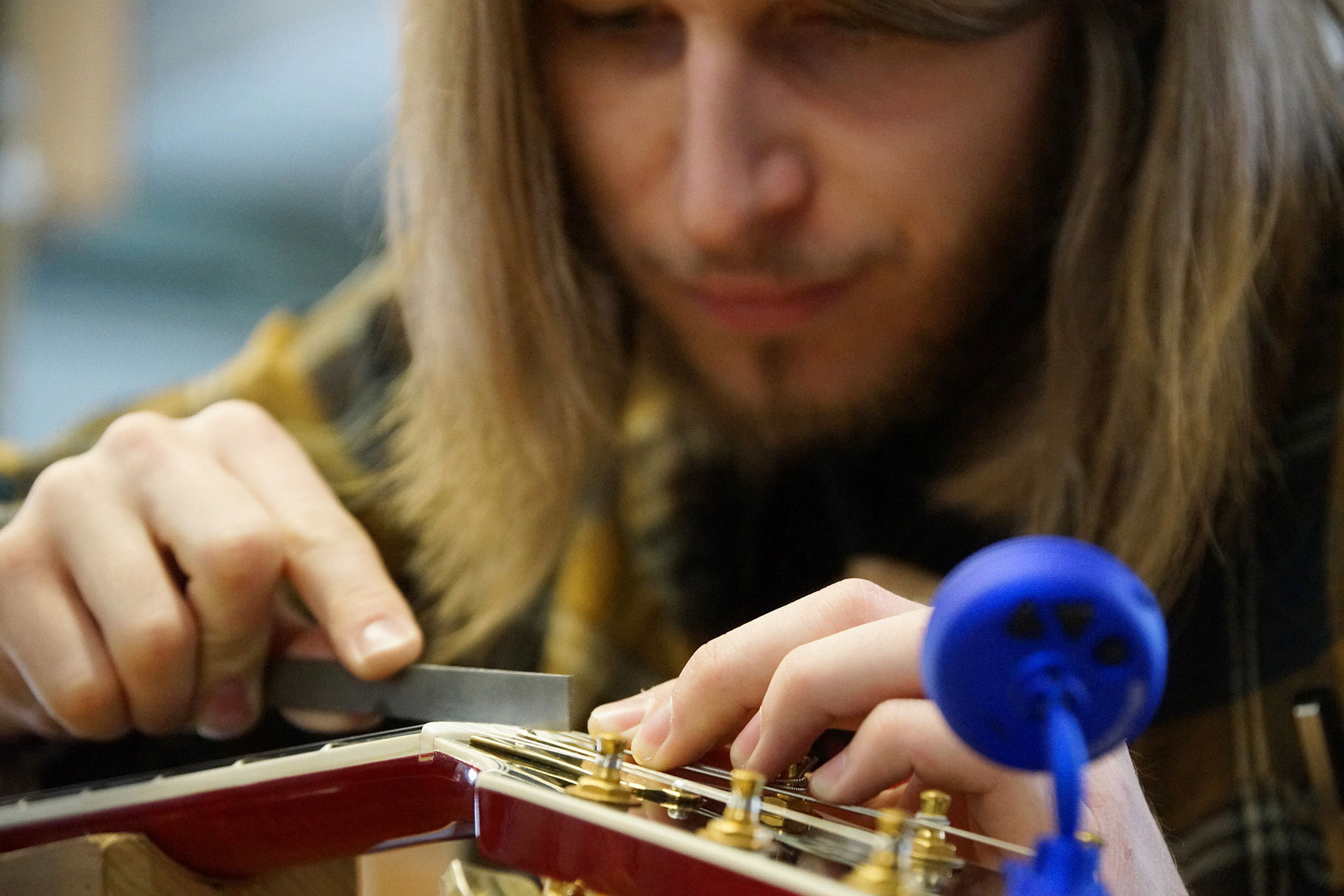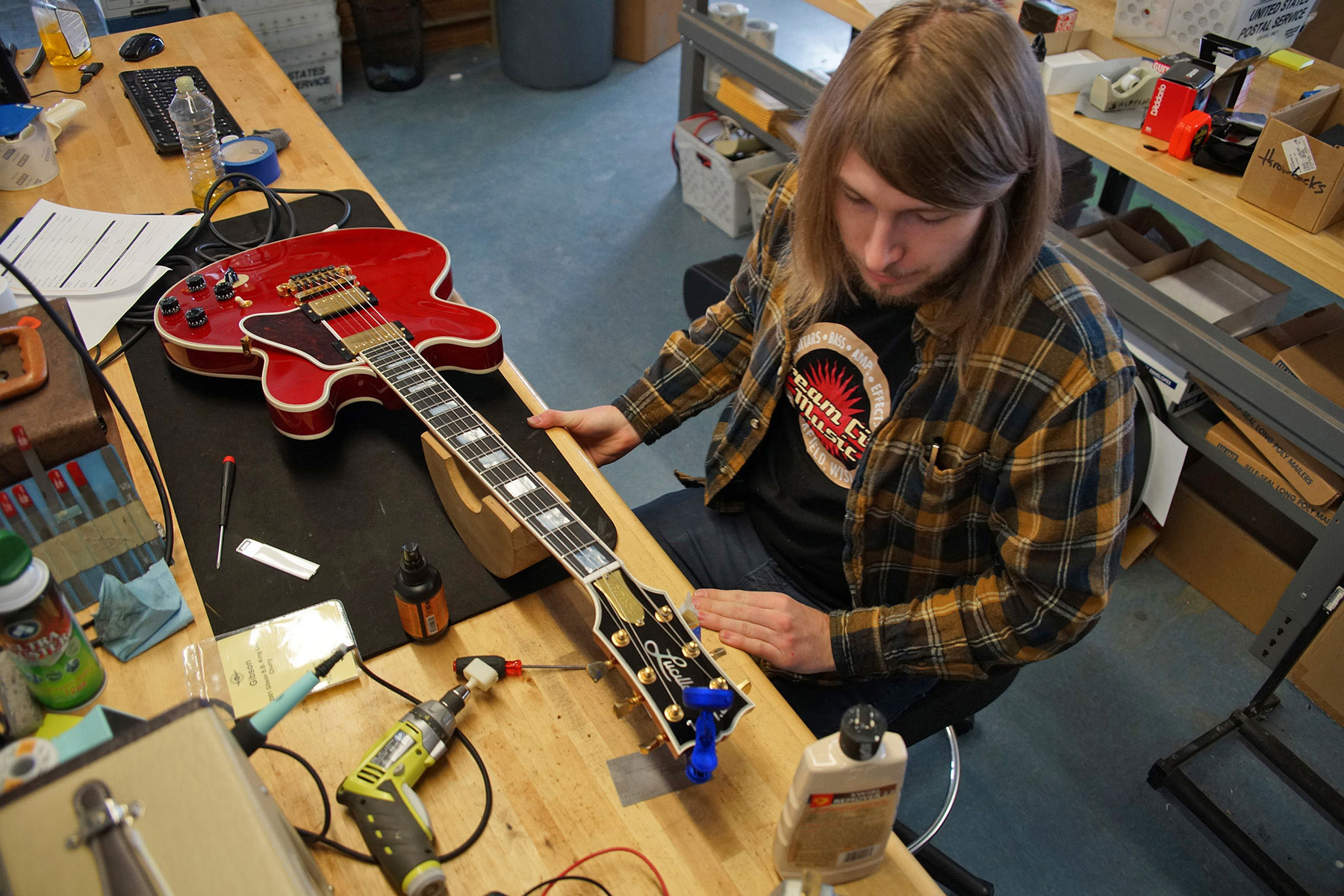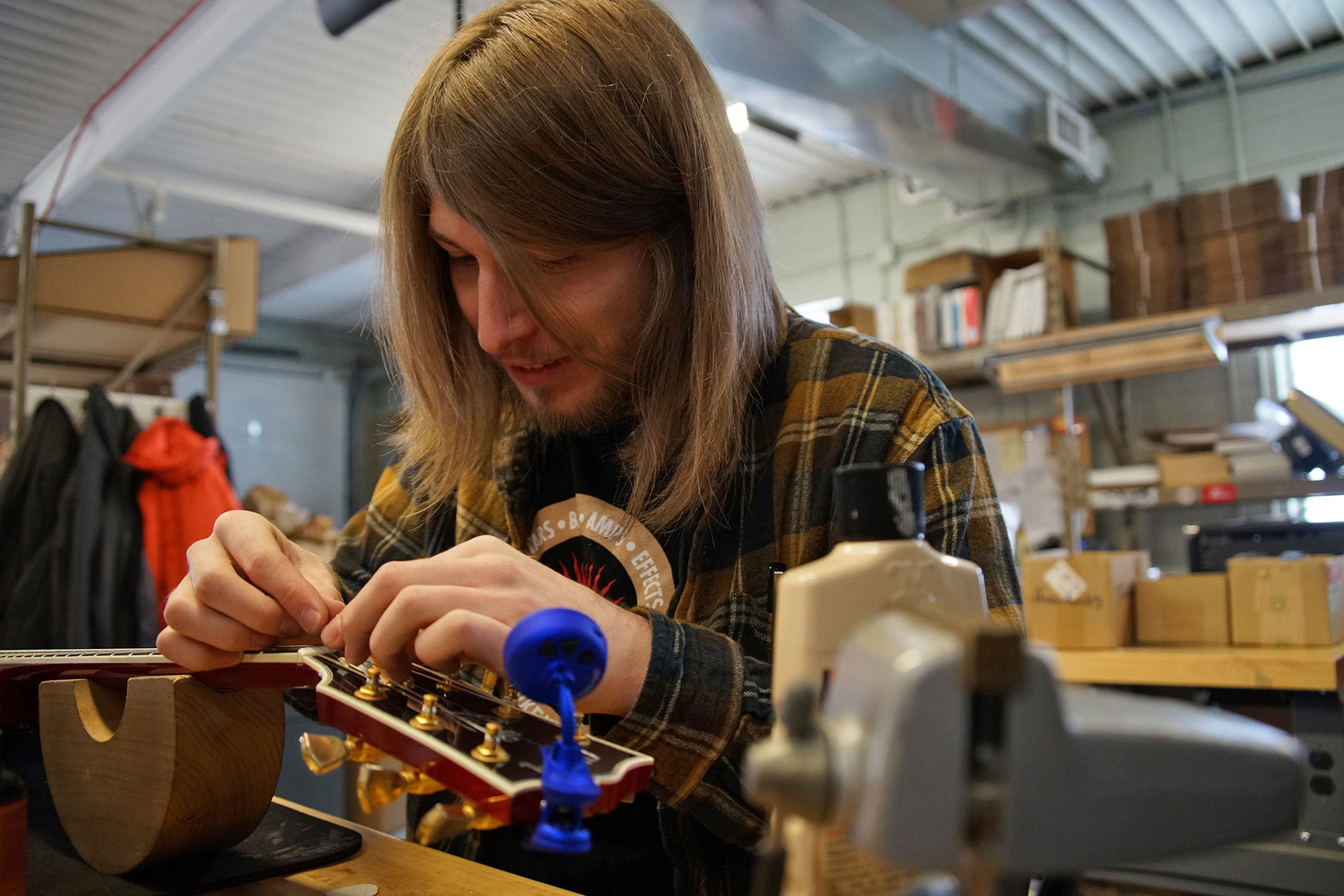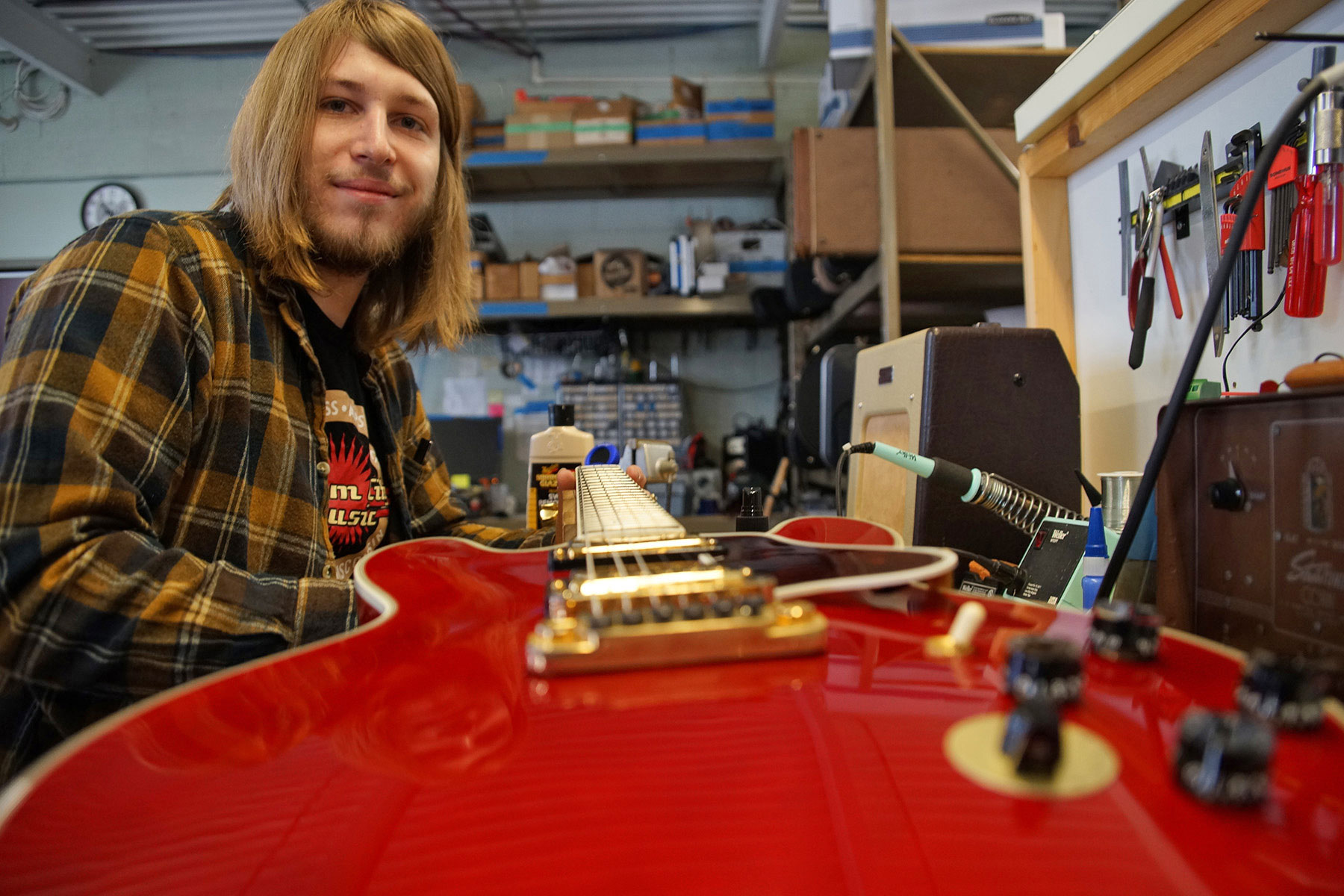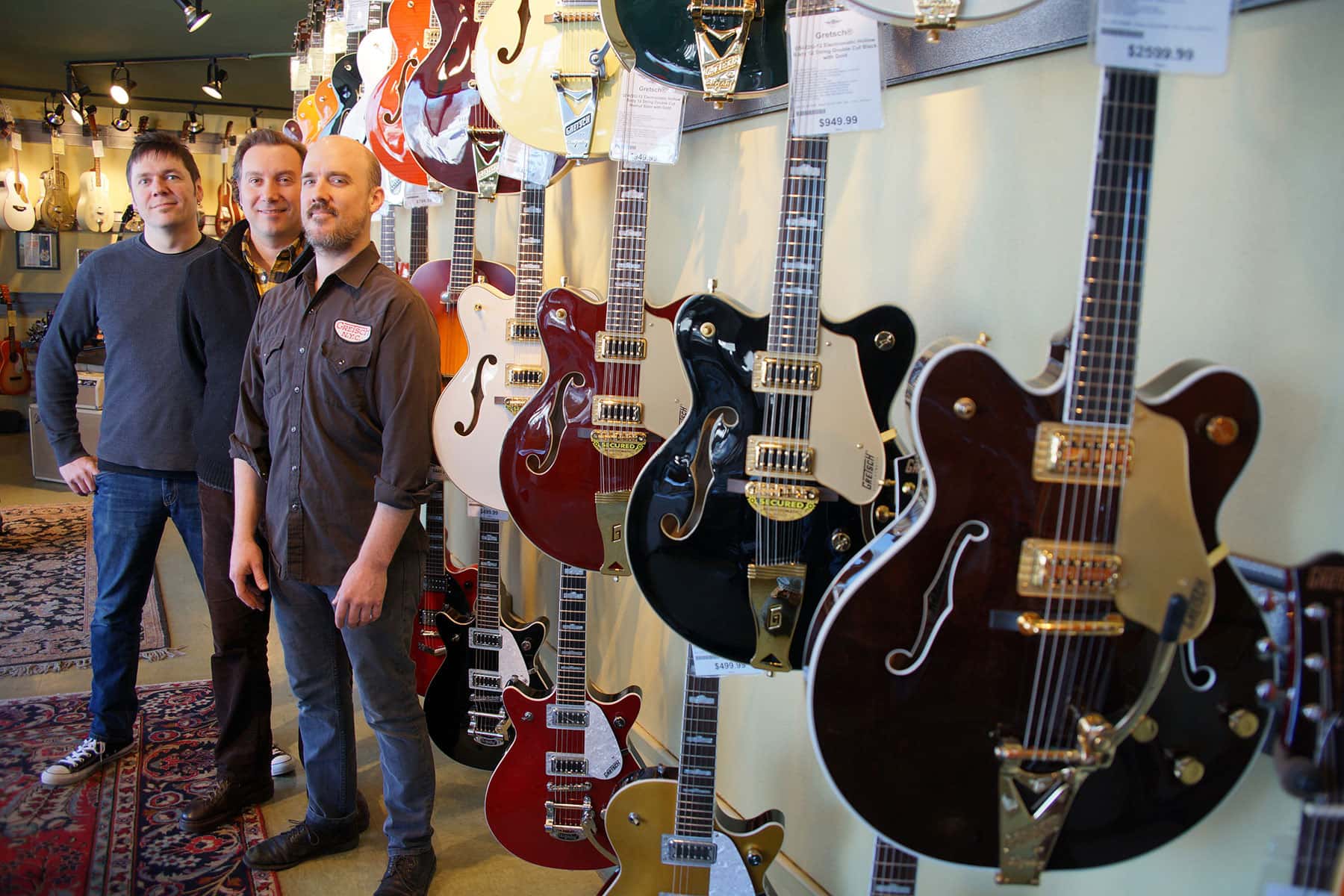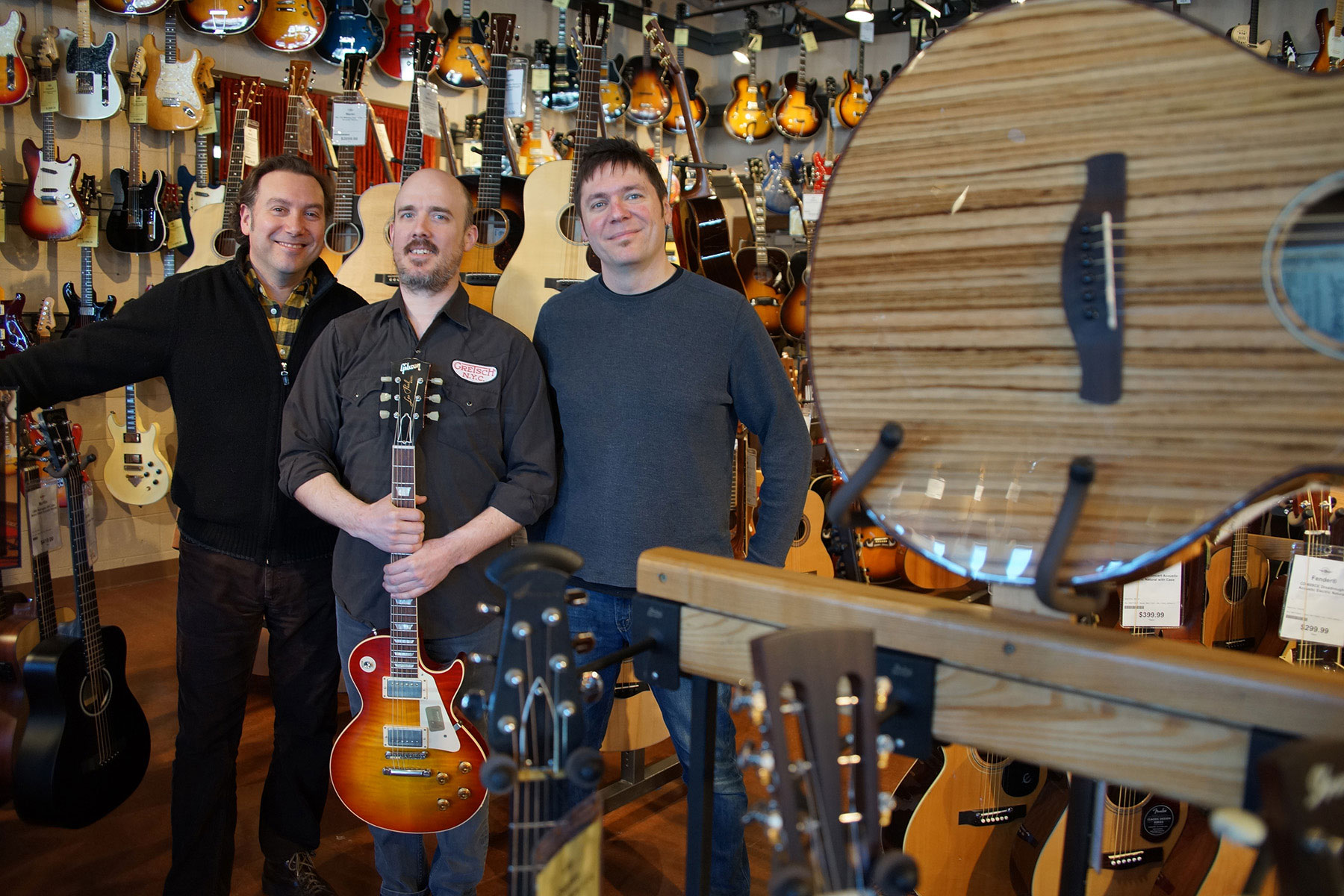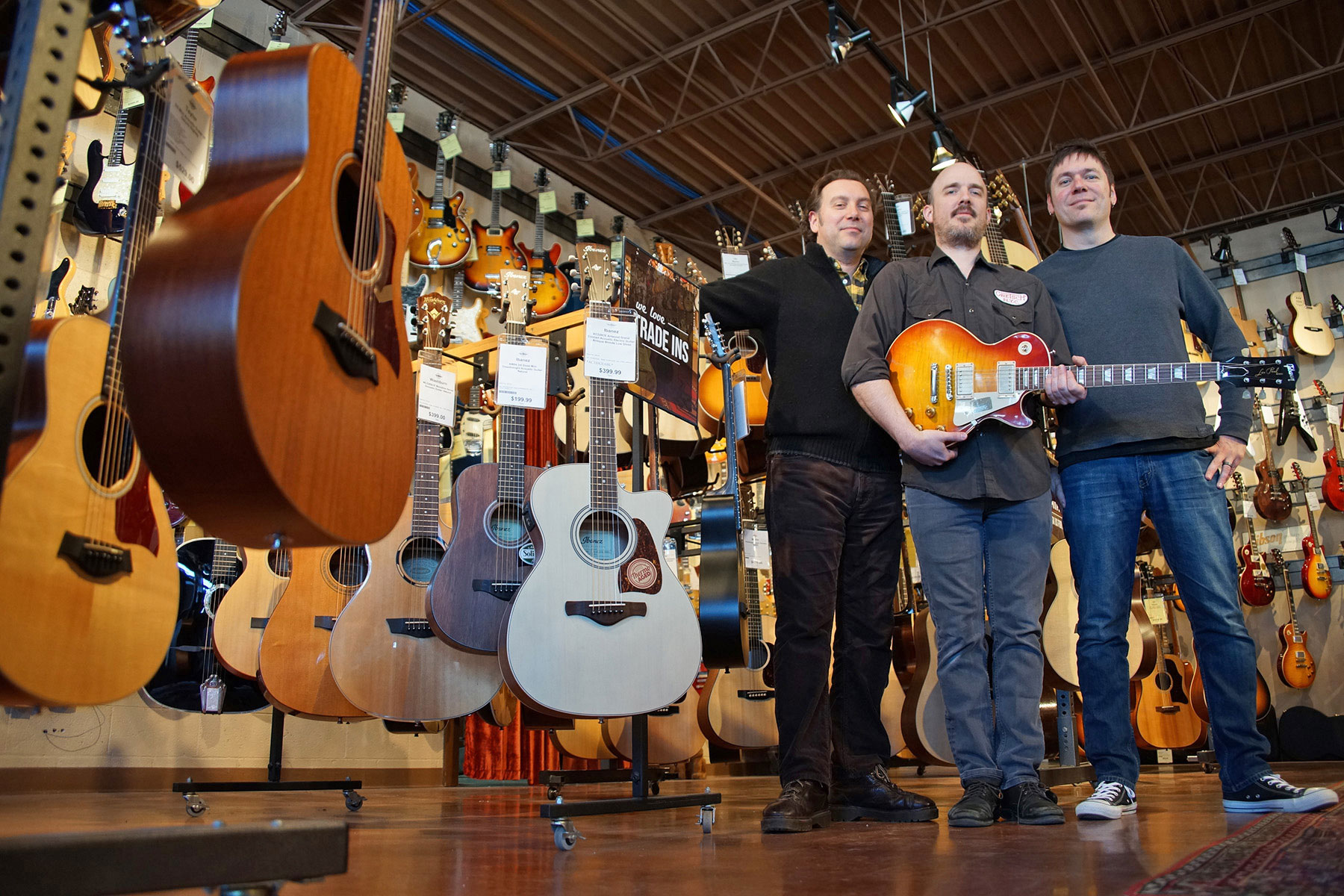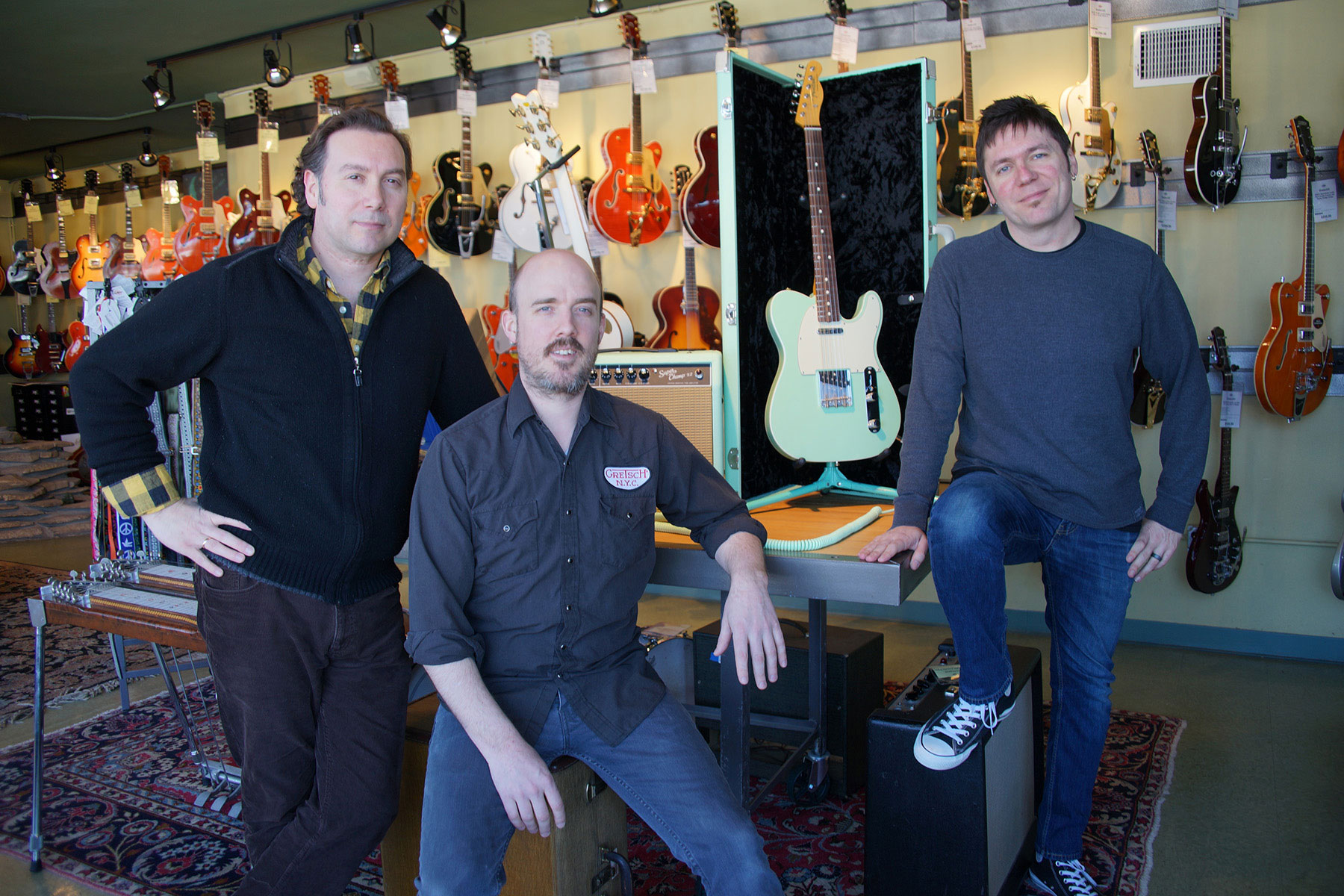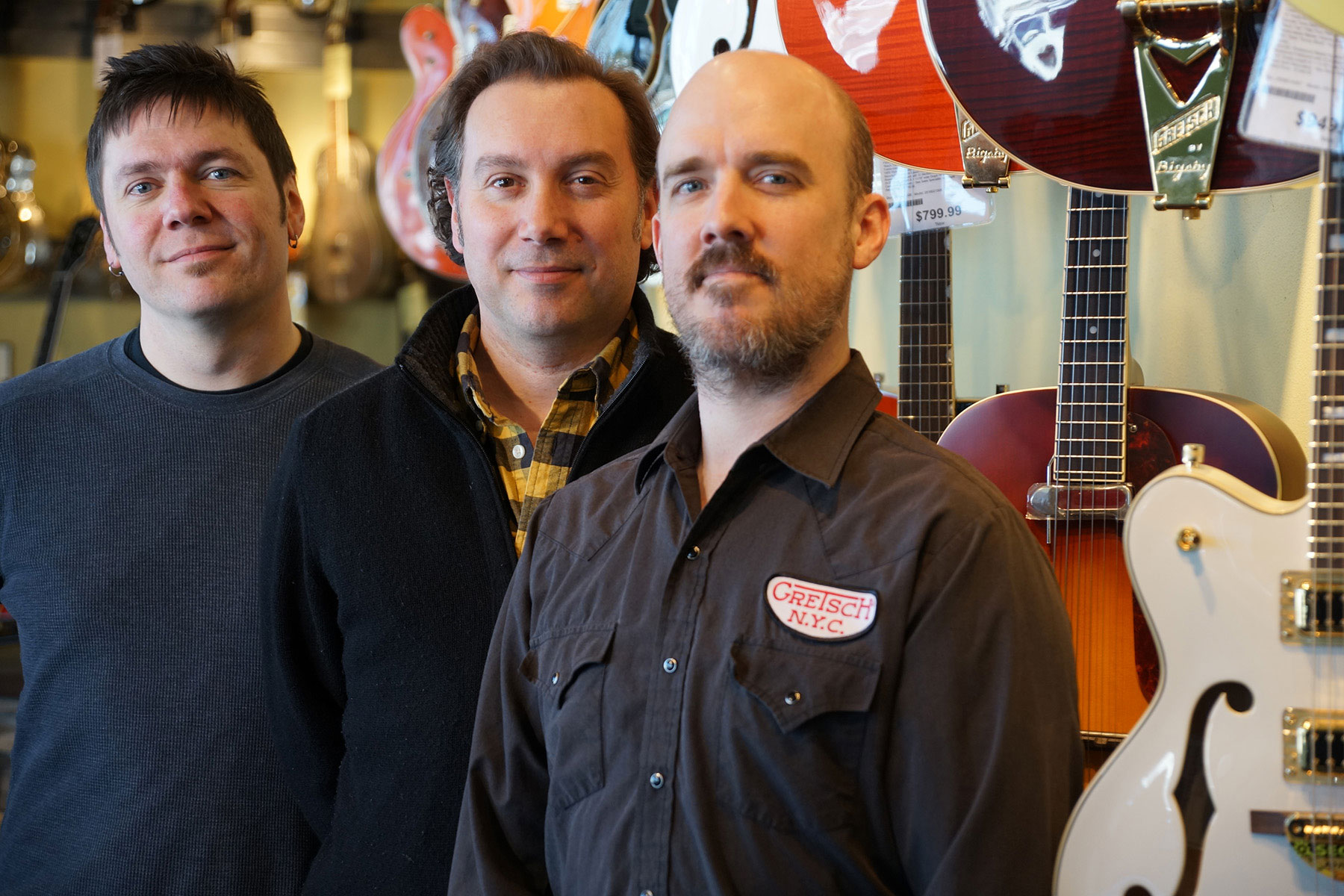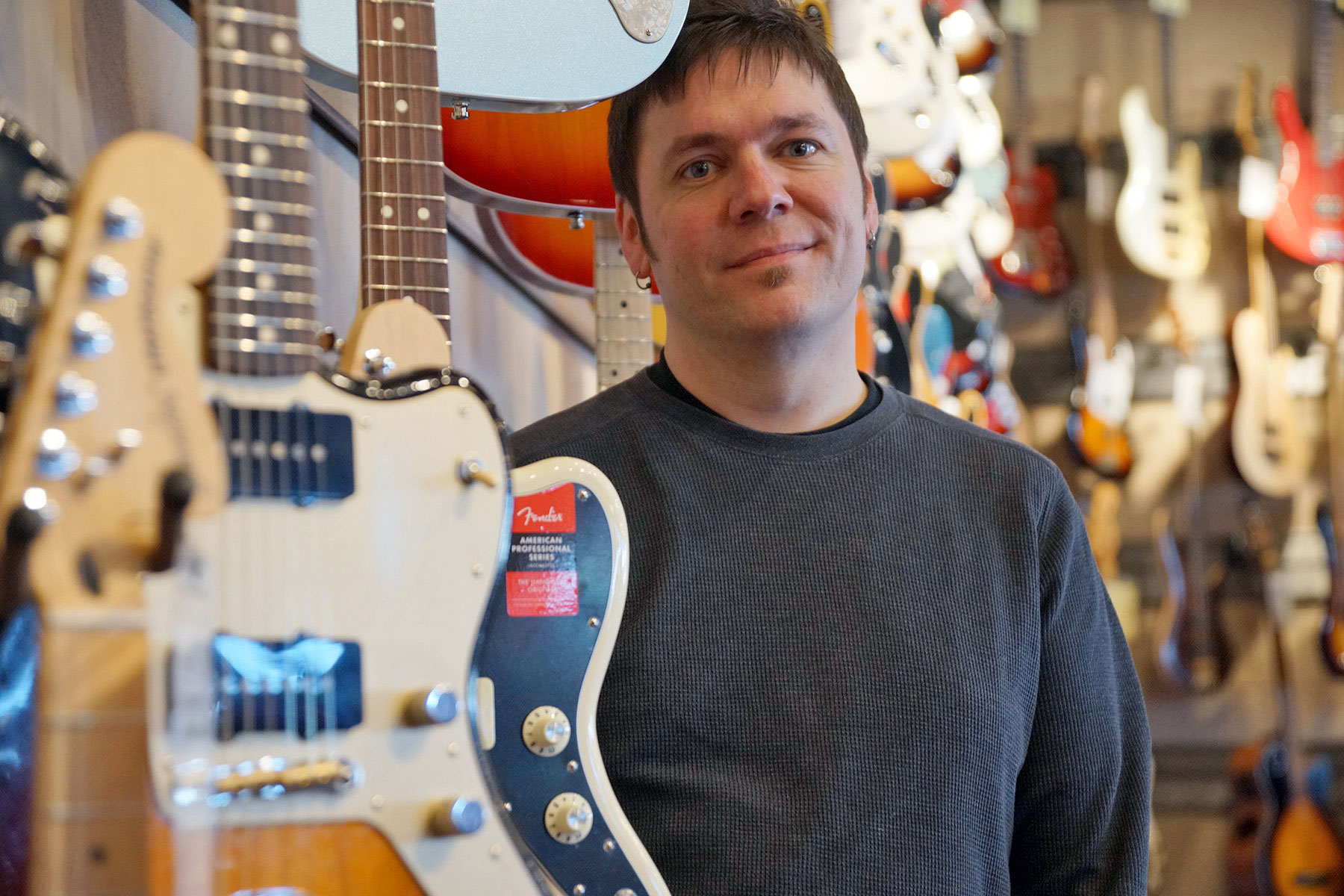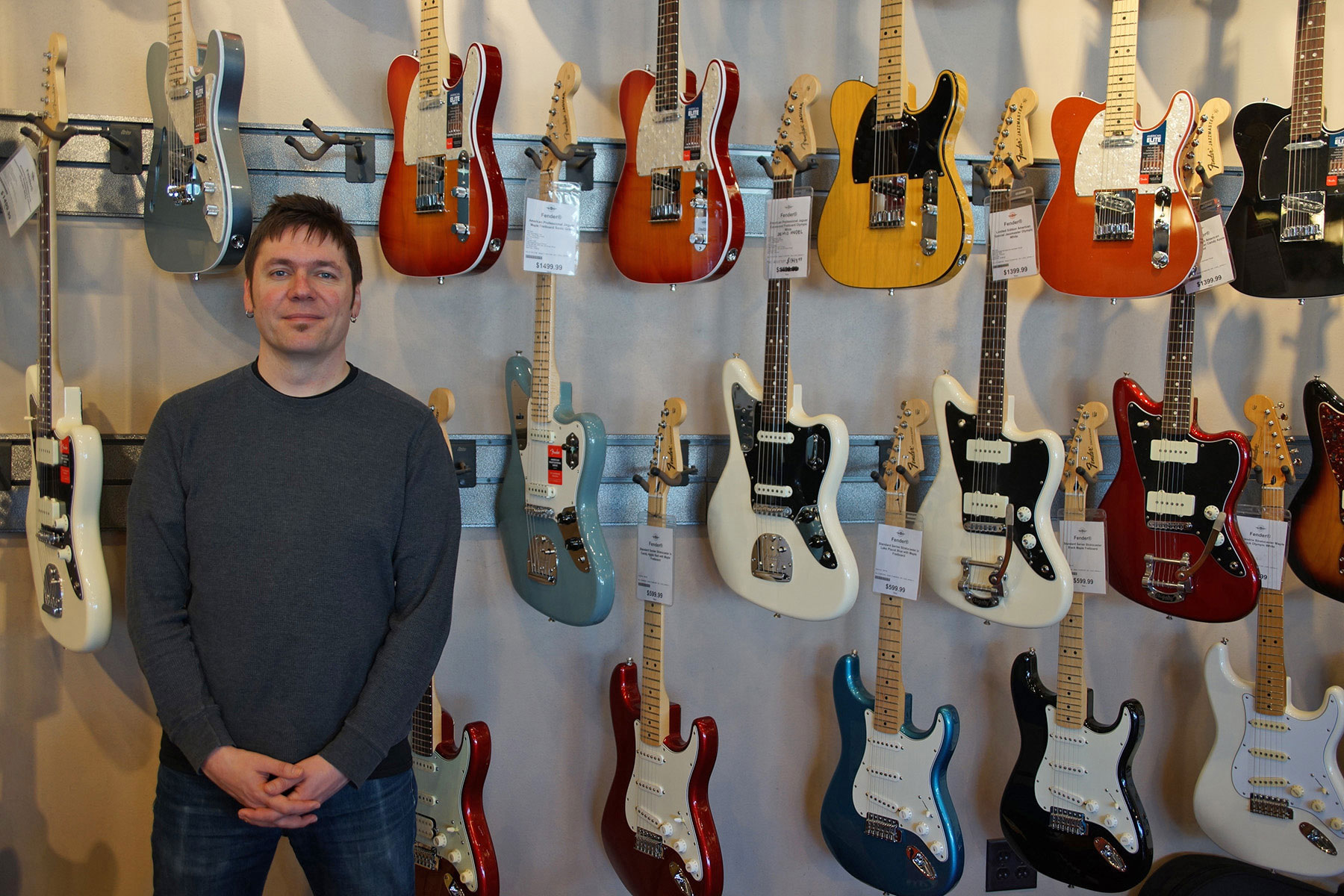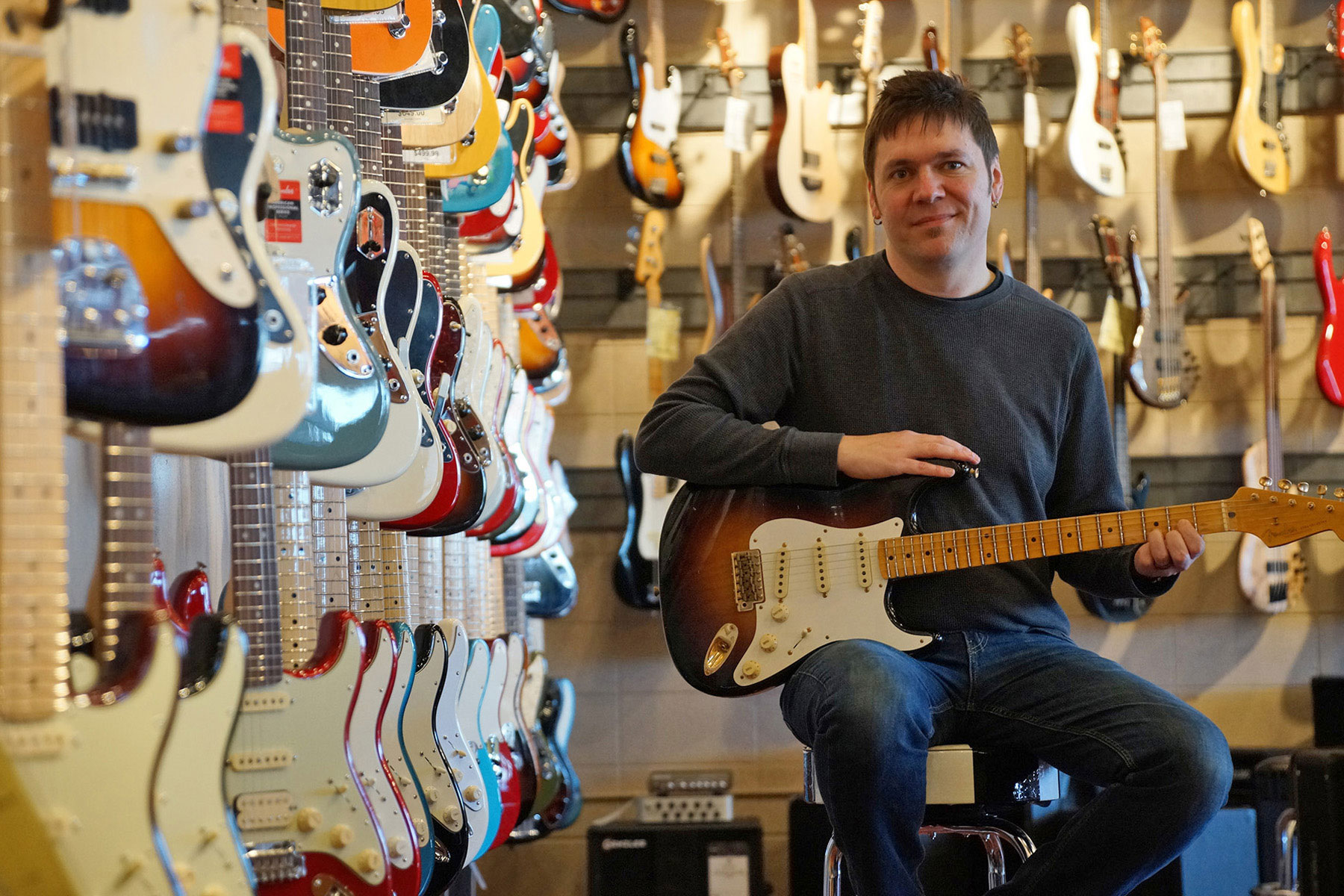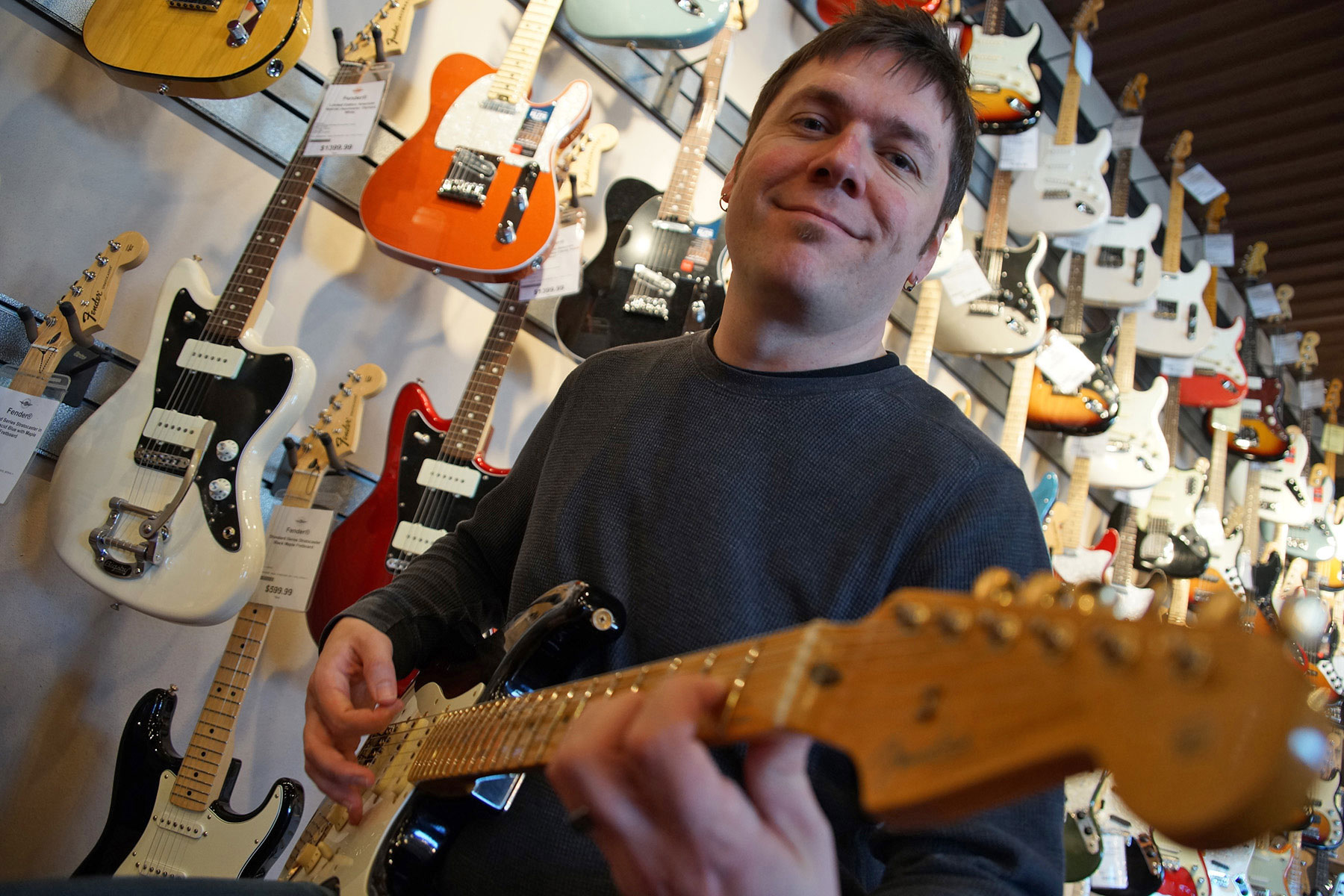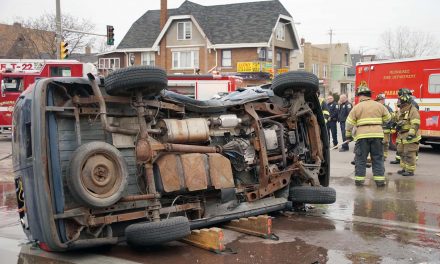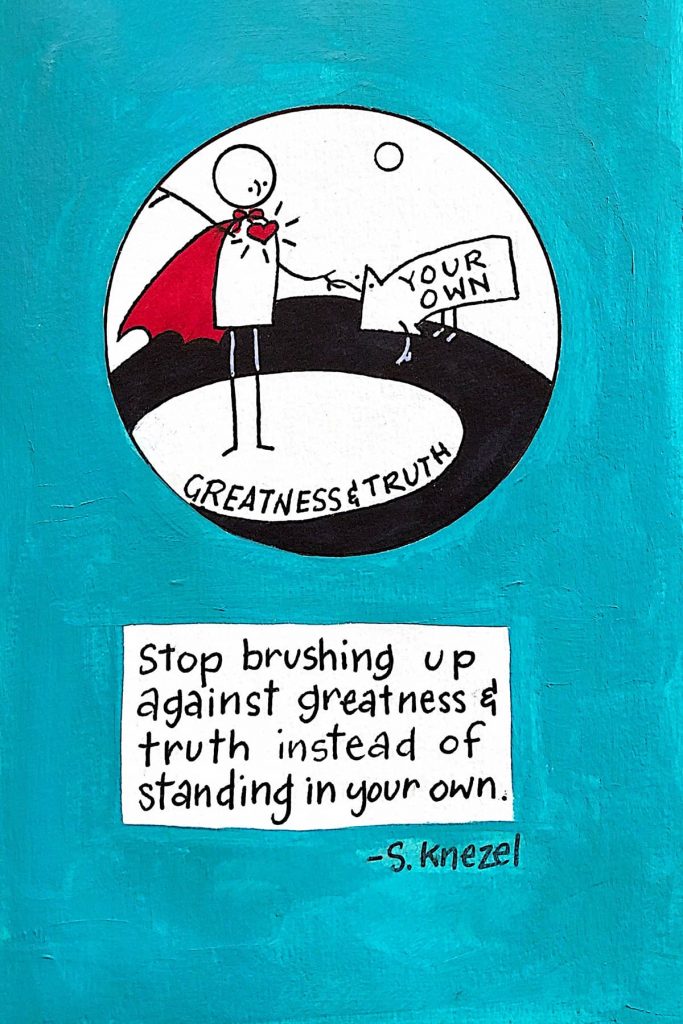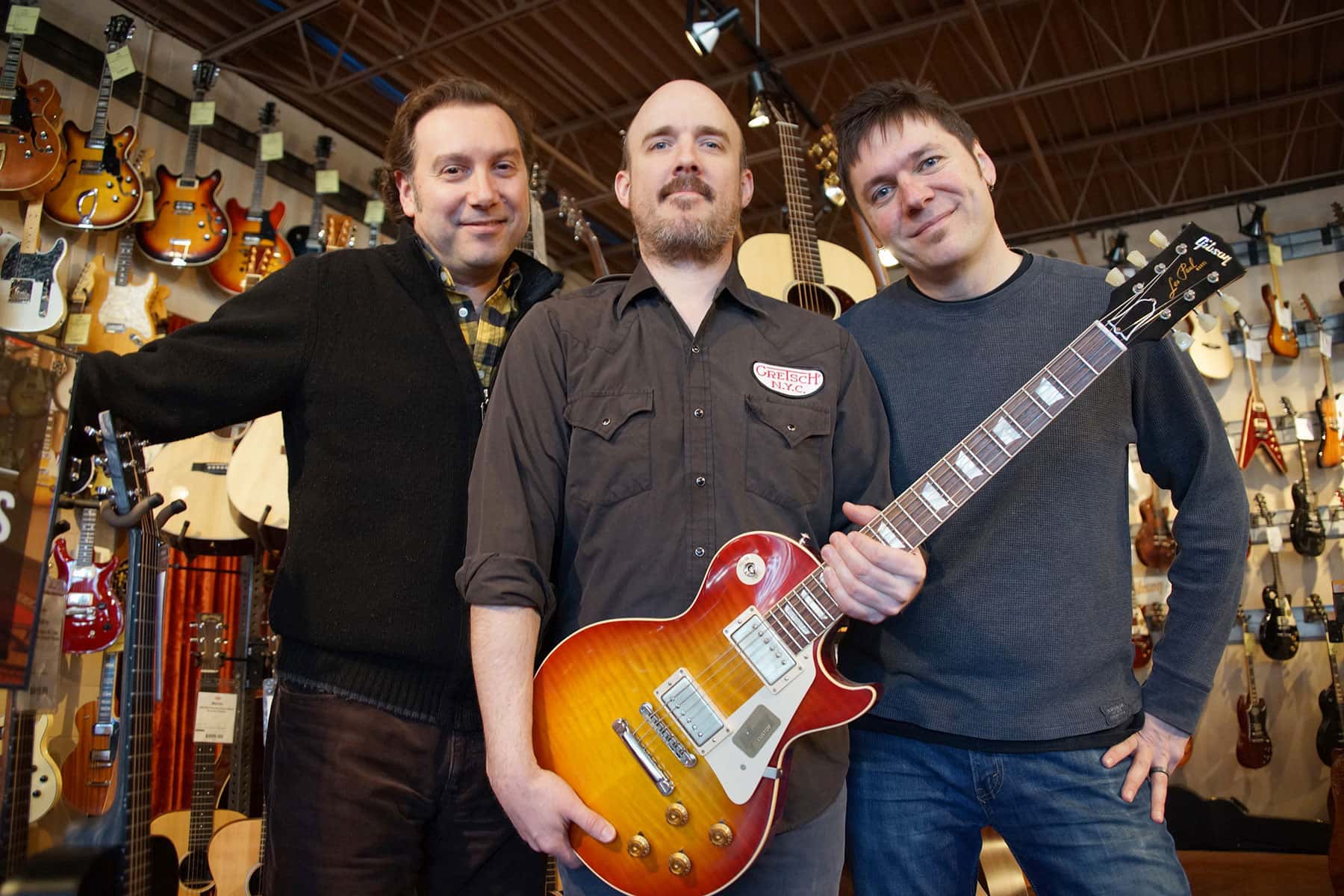
Cream City Music is an owner operated, world class guitar shop located at the edge of Milwaukee. As a destination for all things guitar, the shop attracts enthusiasts of every level from all over the world. The Milwaukee Independent recently sat down with the shop’s leadership Ben Derickson, John Majdalani, and Brian Douglas, to talk about guitars and the personal passion behind their instruments.
Q&A with Cream City Music
Milwaukee Independent: How is music a part of your life, and what does it mean to you?
John Majdalani: It is a huge part of my life. It is something that I participate in on a daily basis. We had a conversation not too long ago about time spent playing, and I probably put in two or three hours a day. When I am done at work, I do a lot of playing at home. From the time I was a young guy, it has always been a part of who I am. It is a part of me, my DNA. I started off as a listener obviously, because as a kid I could only listen to certain pieces of music. But I got inspired, and that was what prompted me to pick up the guitar in the first place.
Brian Douglas: It means everything. It encompasses every moment of my day. It is the air that I breathe. I have spent my entire life around the pursuit of music. From the time I was 13 years old I knew right then and there, listening to a specific song from a specific album, that I wanted to make being involved in music a part of the rest of my life. So every single step I took from that point going forward, was to find a way to make music the central part of my life. Wether it was listening to music, making music, and then finally being involved with the music industry, I have managed to do that. I have worked with music in this business every single day for the last 20 years, so it is the air that I breathe. I cannot imagine a life without it.
Ben Derickson: Music is a given, it is just an every day experience. Whether it is listening or creating, it is a big part of me. It also offers camaraderie, the guys I play with in a band are part of my social life, they are my best friends. So it can be a really powerful experience.
Milwaukee Independent: Do you think without musical backgrounds have a misconception of musicians as just entertainers and not artists?
Ben Derickson: For the three of us here, we live by music but it is obviously not our day job. Our day job is running the store, and that is another passion for us. We play music as a love, because we have to. It is not for the income, it is part of our lives, something we cannot let go of. So the idea that everyone in a band has roadies, and tours, and it is a glamorous full-time job is not a reality for most of the musicians out there. They are people just like us who do it because we love it and cannot stop.
Brian Douglas: There is no way I could be whole as a person if I was not creating music. It is something that people who are not musicians, who have yet to take their journey with music, what they do not recognize is that once it becomes part of you it never leaves. I will never be in a position that I can imagine where I am not going to be creating something musically in some way, shape, or form. If I’m not doing it, I’m simply not whole.
John Majdalani: The guitar itself is a tool, but it is not a plumber’s tool, like a screwdriver or a wrench. I do not think a plumber is going home and caressing his tools and sleeping with them like some guys do with their guitars. Even though a guitar is a tool, it is an art form unto itself. A person does not have to be a guitar player to appreciate the craftsmanship. I have a friend who comes into the shop. She does not even play the guitar, she just loves to look around at the guitars, and touch the guitars, and be around them. There is something sexy about the guitar. I cannot guess how many thousands of books have been written about the guitar, but I do not know too many books that have been published about screwdrivers. I am not an artist or a painter, but I love going down to the museum. I have an appreciation for Picasso or Renoir, but I cannot paint. We are drawn to art, and I think the same kind of magical experience happens with people who are not guitarists. There is something about our shop that draws people in.
Milwaukee Independent: What would be the ultimate instrument for you to personally own, the quintessential guitar?
Brian Douglas: That is going to be a different answer for every musician you speak to. For me, it would be something akin to a 1957 Stratocaster. I think the Fender Stratocaster is the ultimate guitar in terms of versatility, playability, and what can be done with it sonically. It is unparalleled against any other instrument out there, in my opinion. Fender has always been my favorite brand of instrument, so if I could have one guitar to rule them all without a doubt it is a Strat.
John Majdalani: It is an impossible question to answer, but I would have to say the ultimate guitar is the one I do not have.
Ben Derickson: I am kind of the odd man out, I am a drummer by trade but I love guitars. If I could have only one, I probably would choose a 1955 Chet Atkins 6120. It was the first year of that Chet Atkins ‘Nashville’ model, the one that sort of started it all for Gretsch. Also, it is just cool, something hard to put a finger on why I like it, just what I gravitate towards.
Milwaukee Independent: What is the most common question you are asked, related to music or guitars?
Brian Douglas: From the 16 years that I have spent on the retail floor, the most common question I have heard, time after time, would be ‘I am interested in learning to play the guitar, where should I start?’ Without a doubt, that question has been asked and answered by us thousands upon thousands of times over the years. I think that is very much part of the spirit of Cream City Music. Not only are we a place for the pro, the collector, and the aficionado, we are also recognized as a place where somebody who has absolutely no knowledge can come to. They can find answers to their questions, and begin the first step in the journey of what it means to become a musician. We are very sensitive to that experience, because none of us have forgotten what it is like to hold an instrument in our hands for the first time, and strum those chords, and feel that magic. It changes a person completely, it changed the course of my life, those first 3 chords. When we have the opportunity to answer that question for somebody, and give them that experience, knowing that they are going to understand that feeling, it is transformational.
Milwaukee Independent: What is the one question that nobody ever asks that you wish they would?
Brian Douglas: When people come in to the shop, they often have an idea of what it is they already want. People may ask about an instrument, but rarely do they ask the question ‘is this the right instrument for me?’ I do not think I have ever had anyone ask that. I have been guilty myself, of not asking the question. I have a thought in my mind of exactly what instrument I need in order to accomplish what it is I want to do in a recording. In the studio, I realize this is not the right instrument for me. I have to turn around and sell it off, then look for the next thing.
Other music stores just want to make a sale, with a one size fits all approach to instruments, like a customer is shopping for pants and not a guitar. We are able to help people make sure that they are not just buying a pair of pants, that they are finding a brush that allows him to paint a masterpiece with sound. We are helping them find a specific tool that they need, by understanding the personal conversation they are having with music.
Milwaukee Independent: What makes Cream City Music different from other guitar shops, and why do they come to a brick and mortar location instead of just shopping online?
Brian Douglas: What makes Cream City Music stand apart, from all of our competitors throughout the music retail business, is that we offer a level of selection and expertise in customer service that is recognized as one of the finest in the industry. All the members of our team are lifelong musicians, who have a commitment to helping people find the tools they need to unlock their creative potential, in a way that simply cannot be found elsewhere.
Milwaukee Independent: How did the store end up where it is and not around downtown Milwaukee where the music scene is more heavily concentrated?
John Majdalani: The location where we are right now was established by the previous owner. One interesting thing about the shop is that we have three partners here that, prior to running it, were all friends and employees of the previous owner. So the shop itself existed already in this building. This is kind of a destination location. It is on a great plot of land on Bluemound Road, with a big blue guitar out front, so people really cannot miss it when driving up or down the major thoroughfare.
Ben Derickson: The building also fits our business. It was designed and built in the 1950s, so the vibe and feel of it really works well. The inventory that we carry is also a good size, so we need this amount of space which is not easy to find. The building is in a good spot, there is a lot of traffic, it is easy to get to whether from the Northside or Southside of Milwaukee, even as far as Madison. So it is a prime location for lots of reasons.
Milwaukee Independent: From the perspective of a non-musician, Cream City Music seems like an imagination of what a guitar store should look like, so why do other shops appear so clinical?
Ben Derickson: Everything from the cabinets that the petals are in, to the light fixtures, to the furniture has been hand selected to have a really cool vibe, with a warm and inviting feel. Those elements were chosen for a reason.
Brian Douglas: When you look at music stores, a lot of people treat the musical instruments simply as commodities. It is gear that they sell to make money. For us, everything that is found here relates to the atmosphere of the store. We are here to take people on a journey of music throughout their life, from a very entry-level instrument, all the way up to a high-end vintage piece that we find and curate. Our entire retail atmosphere is created that way. How we train our staff and present ourselves to the public is by design. It allows us to be the stewards of a musical journey for people, from the beginning and all the way through to the end. That journey is something we take very seriously and it is a lot of fun. Customers can see that vibe and energy in the store by the way things are set up.
Milwaukee Independent: The shop also does repairs, and considering many of the instruments are vintage is that type of craftsmanship a fading craft?
Brian Douglas: It is not a dying craft, it is part of what sets our store apart from a lot of the other shops. We have two really great guys that work in-house. Ron Jones is our master luthier, who has been honing his craft for 30 years, he could basically build a guitar. And we just hired on Tyler Schenkon, who is a really great tech and apprenticing under Ron. So we have surrounded ourselves with really key individuals who are experts in their craft.
John Majdalani: It is not a fading art, it is just not a commonly practiced craft. The amount of individuals interested in doing that type of work is small, but that also reflects on our team. We have a lot old and new in the group. We have the voice of experience and the skill of experience, and that knowledge is being passed along. It is about keeping the tradition alive and that is something very important to us, as far as what we do.
Milwaukee Independent: Having a musical background, what is your opinion of the Milwaukee music scene? Do any of your sales follow the local music trends?
Ben Derickson: We cater to professionals here in Milwaukee a great deal, and we have all kinds of customers, from beginners to home players to professionals, and everywhere in between. I think the local music scene is vibrant, and there are a ton of great bands doing really great stuff. The area has studios, both big and small, that are cranking out really amazing albums. So there is cool stuff happening in Milwaukee’s music scene. A lot of it is with guitar, rock ‘n’ roll bands with one to three or even more guitars. So that is good for our business.
Milwaukee Independent: Who makes up the main demographic of your customer base, the amateur or the professional?
John Majdalani: Professional musicians are a big part of our business, but they are also not the majority of it. We have a lot of beginners, a lot of home players, I personally am a home player as is a lot of our staff. There are hobbyists and collectors. People who just appreciate instruments, and a lot of customers just love guitars.
Brian Douglas: The key thing to remember about the shop is that we reach a really broad audience, from all demographics. Guitars are for sale all over the showroom, and regardless of being new or used, there are price points from between $100 and $10,000. We do that to cast a very wide net. We will sell guitars to young kids who are just learning to play, to people who are good but not experts, to pro players. That is the beauty of the shop, there is something for everyone here.
Ben Derickson: When someone get to a point where they want to part with a guitar, it can be an emotional experience. I have had grown men standing in front of me, and they start bawling when they had to part with a particular guitar. Maybe it was owned by father or grandfather, or with them for many years. But it represented something beyond the tool of the trade, it was almost like a member of the family. Guitars can become an heirloom really quick.
© Photo
Lee Matz
Read the article and view the photo essay that were produced as companion features for this news report.

